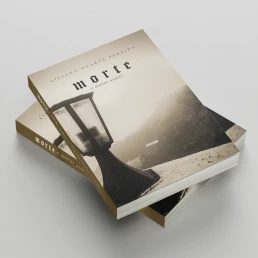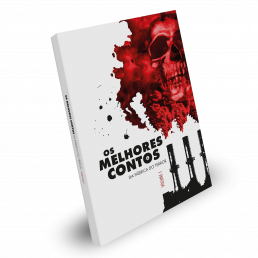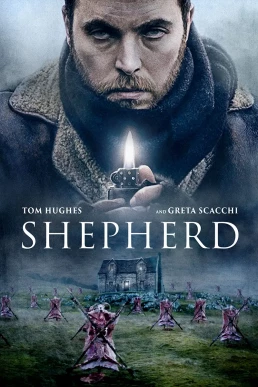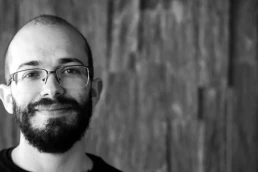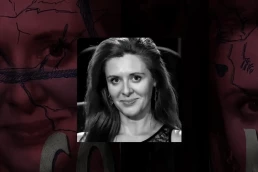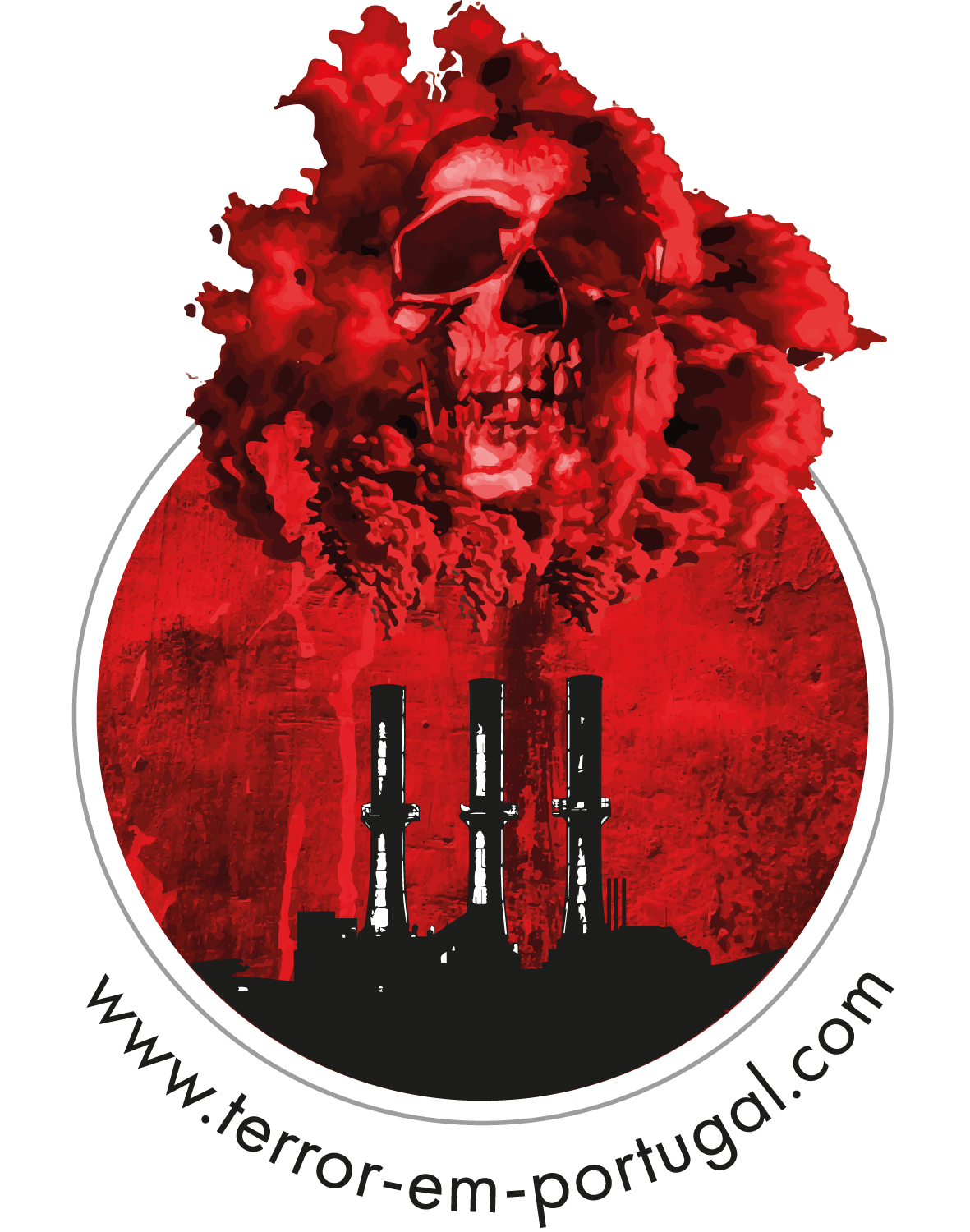Interview with Russell Owen, director of “Shepherd”
Fantasporto 2023 awards for Best Actor and Best Cinematography
“I love horror. And obviously “Shepherd” is a much quieter horror. It’s psychological. It’s about atmosphere and intention. I love horror because it’s the most innovative genre of all genres.”
Os nossos livros estão à venda!
«Morte e Outros Azares»
16.50 € (com IVA)«Os Melhores Contos da Fábrica do Terror – Vol. 1»
16.50 € (com IVA)“Shepherd” opened the 43rd edition of Fantasporto and the audience complimented, among other things, the film’s cinematography. It won the award for Best Cinematography in the official Fantasy Section, and Tom Hughes won Best Actor in the same section.
We talked to Russell Owen a couple of days after the premiere about filmmaking in the United Kingdom, the future of horror in that country, and his next projects.
***
For the people who haven’t watched the movie, what can you tell us about it? What’s the story?
The story was based on a true story, a Welsh legend, which is the same story, that Robert Eggers based “The Lighthouse” on: two men in a small lighthouse off the coast of Wales, who went mad in the late 1700s or the 1800s. One died and the other one went crazy, and it changed lighthouse law, back then, for good. I loved the idea, but I was only about 18, 19, when I started writing it and I lived in Wales. Then it developed and I changed it. In the UK, there’s always a little island with sheep on, somewhere. And there’s always a job in the back of the newspaper. Thousands of people around the world think it’s a dream job and apply, because they can live off-grid, in the middle of nowhere, and to me that’s pure horror. I mean, you’d go mad. So I thought I would combine this isolation idea, and it developed into “Shepherd”.
It’s about one man, Eric Black, who has lost his wife in mysterious circumstances, and decides to run away from it all and take a job as a shepherd, looking after 600 plus sheep. And his psychology catches up with him, he goes mad and questions reality, what’s a dream and what’s not.
You mentioned during the presentation that it took you around 20 years to make this movie. What changed from the beginning, beside the fact that you started to add small things? Was this the original idea or was it something else?
Funny enough, it’s the one thing I’ve written which didn’t change that much when I came to making it, because it’s a very simple ghost story. When I wrote it, in the early 2000s, nobody was interested. I was way to young to be making a film, everything was shot on film; digital still wasn’t that good, and, when it was, it was really expensive, and so on and so forth. It was really tough. I made a couple of short films, but then managed to get into commercials. And I thought I couldn’t get anywhere in film, but I could do something in commercials. It was a shock that people were giving me money to make something. It was great just having money to make films. I did that for so long, and there was one commercial I made with David Beckham. The producer of “Shepherd” saw that and went: “Oh, great, we’ve got a film you can do”. And I was just like: “What?!”. [laughs] So it all came full circle. And he gave me this zombie script — a really, really bad zombie script. They wanted to start filming in 5 or 6 weeks. And I said that was way too soon. There was no cast, there was no location, it was set in a prison. So I managed to add a few more weeks to the pre-production and the script was… [laughs] Somebody said to me: “don’t, you’ll ruin your career”. And I said: “I don’t have a film career, there’s nothing to ruin”. So I said: “I’ll tell you what, I’m going to do this, and I’m going to make it look great, but the next film you make, it has to be ‘Shepherd’, and I’ll do it for free, I won’t get paid”. He said: “yeah, yeah, fine, fine”. So I made that, and true to the word, weeks later, after the screening of that, we started filming “Shepherd”. It was a very difficult path to get there. It was a long convoluted path.
But you knew this was what you wanted to make.
I think if I didn’t make this, it would be stuck in my head for so long… Even tough it’s very simple, it was the first screenplay I’d ever written and I didn’t want to just abandon it and make something else. I’ve written so many other things since that were sort of more advanced, but I was like: “I have to make this work”. Otherwise, it will always live in my head. And it was exactly how it was in my head when I made it, so I was quite proud of myself. It was exactly how I imagined it.
The end of the movie is so open that everyone can have a different interpretation. Can you tell us what was yours? Or do you prefer having that multiple interpretation?
It did have five different endings: he wakes up and he’s back at the island; he’s mad at the island; he’s dead and he’s stuck in purgatory… And I told the different endings to different crewmembers. For example, I would tell the director of photography one thing and then I would tell the actor something else… and I would tell the production designer something else. When he built the inside of the cottage, if you paused and looked at things, all the props would tell you a different story, because he had one interpretation. The DOP had another, so his choices were informed by that. Tom, the actor, had the closest to what I had in mind, but I had another different idea as well. There was no clear idea, because the character himself is completely confused, and you want the audience to go on that journey, you didn’t want to tell them “oh, and by the way, this is it”. You want to be in his shoes, almost. So there’s a mystery about his past, but at the same time you’re going on his journey, and he’s now on a mystery of his own.
That’s interesting, making everyone think something different, because the end result really works.
And the ending as well, when the lights go out in the room and he turns around and the production design had changed the door of the cell to the door of the cottage. That could be a nightmare or a dream. It’s everything. Because originally he was going to turn around and he was in the cottage. So it’s just a meeting of all those ideas in the end.
You worked in a zombie movie you didn’t want. But do you want to work in the horror genre or was it just a coincidence?
I love horror. And obviously “Shepherd” is a much quieter horror. It’s psychological. It’s about atmosphere and intention. I love horror because it’s the most innovative genre of all genres. There’s so much experimenting that can be done and it’s always a really good path for new filmmakers to explore. I think other genres are a little bit more locked in to what they can and can’t do. I think horror is much more exploratory. And it’s much more fun. It always is, generally.
How do you feel about horror in the UK, nowadays? I feel there isn’t much coming out lately.
No, there isn’t. There are few really good films. But the industry changed and there’s a lot of big stuff being filmed over there. I mean, it’s expensive to make films now, in the UK, because they make “Star Wars” or they make this big Amazon thing, I mean you’ve got “The Crown” or you’ve got Marvel films and it’s really hard to get studios or base crews. In the UK, you can be relatively inexperienced and get a very good job now, because there’s a shortage of crew. I don’t think you see as much as you used to. I remember, maybe 10 years ago, going to a festival in the UK, you would have tons and tons of zombie films. All sorts of them. Not so much anymore. I think a lot of the films you see coming out of the UK are much more about social realism or political commentary, right up to big studio stuff. It’s less, I think, like in the old Hammer Horror… Those studios are gone. There’s not as much fun.
But you think it’s more because the industry changed than because of the people?
Hollywood movies moved in, and so… A career in film, in the UK, is a viable engine. It never used to be. When I was trying to get in, I was told: “don’t do film, that’s silly. You have to move to Hollywood, you’ll never make it”. Whereas now you can go to a film school and get a job at the BBC, and you can comfortably get an agent — I don’t have an agent [laughs] — and get a job on a film crew, because there’s a lot of work. When I was starting, it was much more of a community. It’s still there; it’s just drowned in a lot more business and money. People suddenly go off and: “oh, I can get a proper paying job, I don’t have to substitute my love of film with working in a cafe”. So yeah, it has changed, I think. And that’s a good thing. I mean, lots of people get work. It will come back round again. I think the UK government, which isn’t great, will end up dropping the tax credits and a lot of these big films will move to Eastern Europe, where the other studios are, and then it will go back to everybody scraping, trying to get work, which won’t be available.
That’s the case in Portugal. And now the big studios are coming here. [laughs] Can you tell us about your next projects?
Well, there were three. I’ve written two. There’s one I’ve been approached about, of which I probably can’t speak. But I’m waiting on the script. Which is great, because, apart from the zombie film, I’ve never been approached by anyone. Again, I don’t have an agent, so… They don’t get the phone up and say: “guess what? Guess what?”. And I’ve written two. One is called “Paper”, and I’m hoping we’ll be filming within the year. I’ve got a really good production crew on board, and it’s more of a comedy horror. I would say it’s like a contemporary version of “Death Becomes Her”. It’s set in the south of France. That’s all I can say about it at the moment. It’s a really great script, and I’ve got amazing producers on board, so hopefully that will be shooting soon. And I have written a follow-up to “Shepherd”, which doesn’t seem at all like it would need a sequel, but it’s set in the same universe with someone in the same area, who is going through something different. I basically put my worst nightmares on paper.
Do you prefer to write or to direct?
Both, equally, because when I’m writing I’m already seeing it. Just to hand it over, I’m like: “it’s got to be like this, it’s got to be like this”. I love both, but it depends. I love directing if the story is good, but I kind of think I just love telling stories. More than just the filmmaking, it’s the storytelling itself.
Would you like to write outside of cinema, or do you only see yourself writing scripts?
I’m trying to take a couple of other scripts that I’ve written, through many years in my spare time… I started writing them into novels because I do like that. And sometimes, when I write, I tend to overexplain everything, write so much detail in. And you don’t need any of that. Production design does that. But I’m like: “well, just to make sure”. So, yeah, I’m probably a frustrated novelist. That would be my old age, when I can’t wander in film sets. Airport bestsellers.
GOSTASTE? PARTILHA!
Cláudio André Redondo
Apaixonado pelos livros desde os oito anos. Desde essa idade que sempre se aventurou pela escrita e foi acumulando histórias na gaveta, mas só recentemente começou a contar histórias de terror. É nesse género que encontra, atualmente, o maior prazer de escrever, sentindo por vezes que abriu uma porta para um lugar sombrio de onde figuras negras procuram sair. A gaveta abriu-se, resta saber o que de lá vem.

